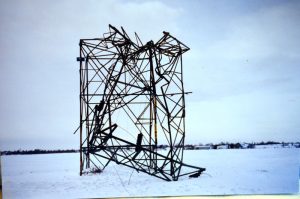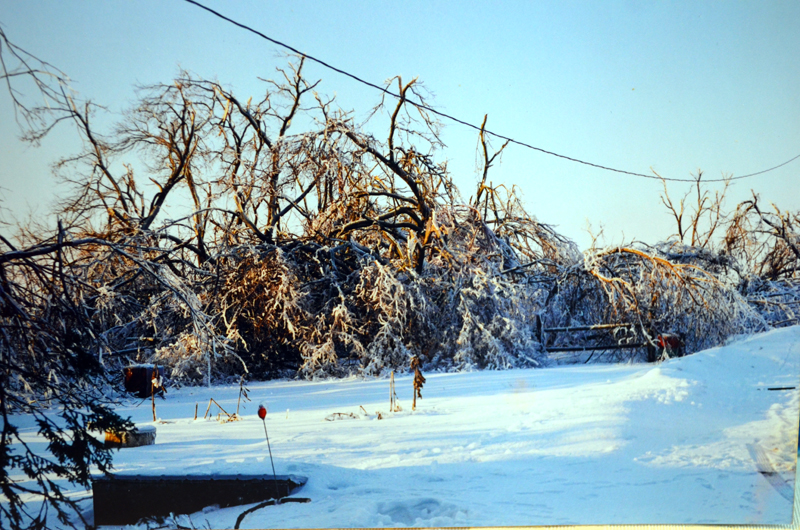Reduced to a fraction
Trees in Eastern Ontario gradually bowed down and broke under pressure of the ice on their branches. This grove shown after the Ice Storm is about a quarter of the height it had been before the storm. Vetter photo

Steel hydro electricity transmission towers near Russell and throughout the area collapsed under the weight of the ice which formed over a five-day period of constant freezing rain, in early January of 1998, 20 years ago. Eastern Ontario and Western Quebec were hit hard, and power was out everywhere. One woman who lived on a hill near Cornwall reported looking out an upstairs window just in time to see towers along the hydro lines collapsing like dominoes. Vetter photo
The great ice storm of 1998 was 20 years ago. I write this on Mon., Jan. 15, marking the 20th anniversary of the day our power came back on.
It was Tues., Jan. 5 when I woke up to the sound of freezing rain on my North Russell farmhouse’s roof. When the power went out I was pretty confident we could keep ourselves warm and fed. We had a wood stove and I’d cooked on it often as well as relied on it for heat.
What I found particularly interesting was the effects on currency, community and mental health. Plastic cards were absolutely useless without electricity, and we returned, within a day, to using cash and sometimes cheques.
I rated the value of commodities in the following order: water, wood, food that could be cooked on a wood stove or barbecue, candles, batteries and flashlights, barbecue supplies, news – especially in the form of newspapers which could also be burned, gasoline, generators (increasingly necessary as the temperatures dropped and electrical workers worked round the clock), chainsaws and supplies, and all our vices — like chocolate, liquor and coffee.
It struck me then, and has stayed with me since, how artificial so much of our lives are, and how little formerly important matters become in a crisis. A few days (or weeks) without power, and we are quickly reduced to the basics. –water, shelter, warmth, food, and companionship.
We visited the local shelter one night, where we enjoyed supper, but mostly went to meet up with our neighbours, find out the news, and share stories of coping and helping those who couldn’t cope.
I remember telling someone I never expected to eat in a Red Cross shelter, or that it would be in Russell, Ont., Canada.
Some experiences weren’t as good as ours. There were residents who lost their lives. Others lost their homes to fire or experienced major water damage. Barn roofs collapsed and livestock were killed. Trees took many years to recover.
That night, 20 years ago today, we returned home to functioning electricity, and profound relief that we’d escaped unscathed.
Candice Vetter








